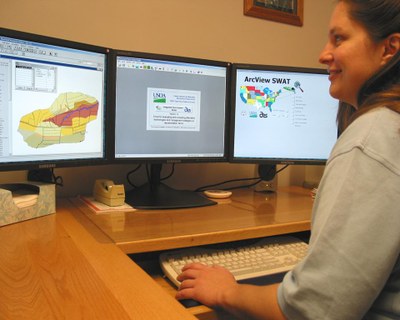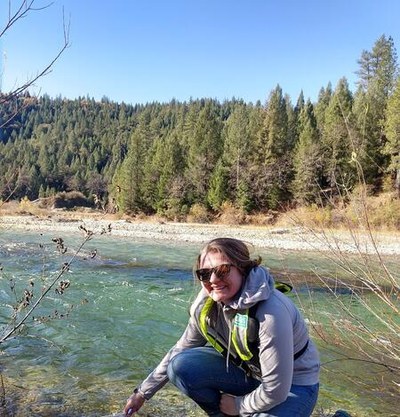
Background
Per- and polyfluoroalkyl substances (PFAS) are a large group of synthetic chemicals that have been used in a wide range of industrial and household products due to their stain resistant and water repelling properties. For example, they are used in non-stick cookware and in water-repellent and stain-resistant coatings for clothing, carpets, and furniture. Unfortunately, the chemical structures of PFAS also make these substances highly resistant to degradation, earning them the nickname “forever chemicals”.
Because of their widespread usage and resistance to degradation, they persist through wastewater treatment plants and are inadvertently introduced into the natural environment during the beneficial reuse of biosolids and/or treated wastewater. PFAS are also widely used in aqueous film-forming foams (AFFF), making airports, military training sites, and firefighting training sites sources of these chemicals. Their occurrence in the environment has been a topic of increasing public concern, given that some PFAS chemicals are known carcinogens, with impacts to human and ecosystem health at concentrations below the limit of detection of current analytical methods. However, despite these concerns and restrictions, minimal research is being conducted on PFAS in agroecosystems, leading to an inability to provide the information necessary to assist stakeholders with decision-making or to inform policy development in a timely manner.
PA-Specific Concerns
In Pennsylvania, state-level drinking water quality standards preceded new federal drinking water standards. However, more than 1 million private wells in the Commonwealth, which provide drinking water to more than 3 million residents, and may need assistance in determining if their drinking water contains unsafe levels of PFAS. More than 600 farms across Pennsylvania beneficially reuse domestic wastewater residuals, including land-application of biosolids or wastewater irrigation. This reuse inadvertently introduces PFAS into the agroecosystem, where impacts to soil, water, and crops are still unclear. PSU Extension receives many PFAS-related questions for which no research-based guidance exists. Further, state-level programs and policies (other than for drinking water) do not yet exist. Research addressing stakeholder needs and informing new policies is urgently needed. Such research requires an interdisciplinary team of researchers and extension educators, with expertise in three broad categories: (i) plant and animal science; (ii) natural resources; and (iii) toxicology and ecotoxicology.
To address these research and extension needs, we created the Penn State Research and Extension Network for PFAS in Agroecosystems.
People

Daniela Carrijo, Ph.D.
Assistant Professor and Extension Specialist of Grain Crop Production
Department of Plant Science

Alyssa Collins, Ph.D.
Associate Research Professor
Director, Southeast Agricultural Research & Extension Center

Patrick Drohan, Ph.D.
Professor of Soil Science
Department of Ecosystem Science and Management

Faith Kibuye, Ph.D.
Water Resources Extension Associate
Department of Ecosystem Science and Management

Enrique Gomez, Ph.D.
Professor of Chemical Engineering and Materials Science and Engineering
Interim Associate Dean for Equity and Inclusion for the College of Engineering

Tyler Groh, Ph.D.
Assistant Research Professor
Watershed Management Extension Specialist

Odette Mina, Ph.D.
Assistant Research Professor
Managing Director of Energy and Environmental Sustainability Laboratories

Hlengilizwe Niyoni, Ph.D.
Assistant Research Professor
Environmental Contaminants Analytical Laboratory

Gary Perdew, Ph.D.
Professor and H. Thomas and Dorothy Willits Hallowell Chair in Agricultural Sciences
Department of Veterinary and Biomedical Sciences

Jeffrey Peters, Ph.D.
Distinguished Professor of Molecular Toxicology & Carcinogenesis
Department of Veterinary and Biomedical Sciences
Deputy Director, Penn State Cancer Institute

Heather Preisendanz, Ph.D.
Professor, Department of Agricultural and Biological Engineering
Director, Institute for Sustainable Agricultural, Food, and Environmental Science

Jon Sweetman, Ph.D.
Assistant Research Professor of Aquatic Science
Department of Ecosystem Science and Management

Cheryl Thompson, Ph.D.
Professor at Penn State College of Medicine
Associate Director, Population Science, Penn State Cancer Institute
Associate Director, Penn State Social Sciences Research Institute

Jack Vanden Heuvel, Ph.D.
Professor of Molecular Toxicology and Pharmacology
Department of Veterinary and Biomedical Sciences

Juliana Vasco-Correa, Ph.D.
Assistant Professor
Department of Agricultural and Biological Engineering

Stephanie Velegol, Ph.D.
Associate Department Head and Teaching Professor
Department of Chemical Engineering
Agency Collaborators

Tamie Veith, Ph.D.
Agricultural Engineering, USDA-ARS
Pasture Systems and Watershed Management Research Unit, University Park, PA
Adjunct Professor, Agricultural and Biological Engineering Department

Clinton Williams, Ph.D.
Soil Scientist and Research Leader, USDA-ARS
Water Management and Conservation Research Unit, Maricopa, AZ

Emily Woodward, Ph.D.
Research Physical Scientist, USGS
Pennsylvania Water Science Center
Current Projects
Assessing the Potential for Hemp to Remediate PFAS-contaminated Agroecosystems
Funding Agency: Pennsylvania Department of Agriculture
Funding Amount: $272,000
Funding Period: July 1, 2024 - June 30, 2026
Project Team: Dr. Heather Preisendanz, Dr. Daniela Carrijo, Dr. Patrick Drohan, and Dr. Faith Kibuye
Evaluating PFAS Occurrence and Fate in Rural Water Supplies and Agricultural Operations to Inform Management Practices
Funding Agency: Environmental Protection Agency under EPA G20B113019085, Grant #R84008201
Funding Amount: $1,609,344
Project Period: September 1, 2020 - August 31, 2025
Project Team: Dr. Linda Lee (Purdue University), Dr. Kurt Pennell (Brown University), and Dr. Heather Preisendanz (Penn State)
Assessing the Potential for Hemp to Remediate PFAS-contaminated Agroecosystems
Funding Agency: Penn State, College of Agricultural Sciences, Strategic Networks Initiative Program (Level II)
Funding Amount: $25,000
Project Period: November 27, 2023 - December 31, 2025
Project Team: Dr. Daniela Carrijo, Dr. Alyssa Collins, Dr. Heather Preisendanz, and Dr. Odette Mina
Evaluating Water Treatment Technologies for PFAS Removal in Disadvantaged Communities
Funding Agency: Penn State, Institute of Energy and the Environment
Funding Amount: $30,000
Project Period: July 1, 2023 - September 30, 2024
Project Team: Dr. Heather Preisendanz, Dr. Faith Kibuye, Dr. Juliana Vasco-Correa, Dr. Enrique Gomez, and Dr. Stephanie Velegol
Understanding Cancer Risks from Exposure to Emerging Contaminant Mixtures in Drinking Water
Funding Agency: Penn State, Cancer Institute
Funding Amount: $59,532
Project Period: June 1, 2023 - May 31, 2024
Project Team: Dr. Heather Preisendanz, Dr. Faith Kibuye, Dr. Jack Vanden Heuvel, Dr. Jeffrey Peters, and Dr. Cheryl Thompson
Evaluating PFAS Fate in Agricultural Systems Impacted by Domestic Wastewater Residuals
Funding Agency: USDA-Natural Resources Conservation Service
Funding Amount: $321,891
Project Period: January 1, 2023 - December 31, 2025
Project Team: Dr. Heather Preisendanz
PFAS Publications
Preisendanz, H.E., H. Li, M. Mashtare, and O. Mina. 2025. PFAS in Agroecosystems: Sources, impacts, and opportunities for mitigating risks to human and ecosystem health. Journal of Environmental Quality, In Press. doi:10.1002/jeq2.20670
Liao, S., U. Garza-Rubalcava, L.M. Abriola, H.E. Preisendanz, L.S. Lee, and K.D. Pennell. 2024. Simulating PFAS transport in effluent-irrigated farmland using PRZM5, LEACHM, and HYDRUS-1D models. Journal of Environmental Quality, In Press. doi:10.1002/jeq2.20639
Kosiarski, K., C.(Z.) Usner., and H.E. Preisendanz. 2024. From wastewater to feed: Understanding per- and polyfluoroalkyl substances occurrence in wastewater-irrigated crops. Journal of Environmental Quality, In Press. doi:10.1002/jeq2.20630
Mroczko, O., H.E. Preisendanz, C. Wilson, M.L. Mashtare, H.A. Elliott, T.L. Veith, K.J. Soder, and J.E. Watson. 2022. Spatiotemporal patterns of PFAS in water and crop tissue at a beneficial wastewater reuse site in central Pennsylvania. Journal of Environmental Quality, 51(6):1282-1297. doi:10.1002/jeq2.20408
Alam, M.S., H.E. Preisendanz, J.R. Fetter, S. Boser, and B.R. Swistock. 2022. Assessing the potential impacts of biosolids applications on the presence of PFAS compounds in nearby groundwater wells: A citizen science-based study in Pennsylvania. ASABE Paper No. 2200110. American Society of Agricultural and Biological Engineers, St. Joseph, MI. doi:10.13031/aim.202200110
Vanden Heuvel, J.P., J.W. Davis II, R. Sommers, and R.E. Peterson. 1992. Renal excretion of perflurooctanoic acid in male rats: Inhibitory effect of testosterone. Journal of Biochemical Toxicology, 7(1):31-36. doi:10.1002/jbt.2570070107
Kuslikis, B.I., J.P. Vanden Heuvel, and R.E. Peterson. 1992. Lack of evidence for perfluorodecanoyl- or perfluroocatnoyl-coenzyme a formaton in male and female rats. Journal of Biochemical Toxicology, 7(1):25-29. doi:10.1002/jbt.2570070106
PFAS Resources
Facilities
Penn State Environmental Contaminants Analytical Laboratory
Penn State Extension Articles
Understanding PFAS
Testing & Treating PFAS Chemicals in PA Water Wells
PFAS News Articles
March 4, 2024: Penn State News
'Growing Impact' examines PFAS water contamination, evaluation of existing tech
March 1, 2024: Penn State 'Growing Impact' Podcast
'Growing Impact': Low-cost PFAS filtration
October 27, 2022: Penn State News
'Forever Chemicals' persist through wastewater treatment, may enter crops

